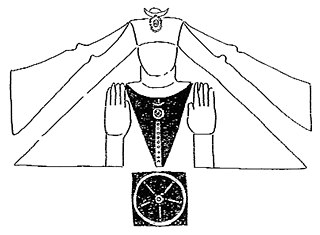 W
WAssianism or Scythian Neopaganism is a modern Pagan religion based on the traditional folk religious beliefs of the Ossetians, modern descendants of the Scythians of the Alan tribes, believed to be a continuation of the ancient Scythian religion. The religion is known as "Assianism" among its Russian adherents, and as Uatsdin (Уацдин), Ætsæg Din, Æss Din, or simply Iron Din by Ossetians in their own language. It started to be revived in a conscious and organised way in the 1980s, as an ethnic religion among the Ossetians.
 W
WAn Azali or Azali Bábí is a follower of the monotheistic religion of Subh-i-Azal and the Báb. Early followers of the Báb were known as Bábís; however, in the 1860s a split occurred after which the vast majority of Bábís followed Mirza Husayn ʻAli, known as Baháʼu'lláh, and became known as Baháʼís, while the minority who followed Subh-i-Azal came to be called as Azalis.
 W
WThe Bábi Faith is an Abrahamic monotheistic religion which professes that there is one incorporeal, unknown, and incomprehensible God who manifests his will in an unending series of theophanies, called Manifestation of God. It has no more than a few thousand adherents according to current estimates, most of whom are concentrated in Iran. It was founded by ʻAli Muhammad Shirazi who first assumed the title of Báb (lit. "Gate") from which the religion gets its name, out of the belief that he was the gate to the Twelfth Imam. However throughout his ministry his titles and claims underwent much evolution as the Báb progressively outlined his teachings.
 W
WThe Baháʼí Faith is a new religion teaching the essential worth of all religions and the unity of all people. Established by Baháʼu'lláh in the 19th century, it initially developed in Persia and parts of the Middle East, where it has faced ongoing persecution since its inception. The religion is estimated to have over five million adherents, known as Baháʼís, spread throughout most of the world's countries and territories.
 W
WAncient Iranian religion or Iranian Paganism, refers to the ancient beliefs and practices of the Iranian peoples before the rise of Zoroastrianism.
 W
WThe Khurramites were an Iranian religious and political movement with its roots in the movement founded by Mazdak. An alternative name for the movement is the Muḥammira, a reference to their symbolic red dress.
 W
WManichaeism was a major religion founded in the 3rd century AD by the Persian or Parthian prophet Mani in the Sasanian Empire.
 W
WMazdak was a Zoroastrian mobad (priest), Iranian reformer, prophet and religious reformer who gained influence during the reign of the Sasanian emperor Kavadh I. He claimed to be a prophet of Ahura Mazda and instituted social welfare programs.
Mazdakism was an Iranian religion, which was an offshoot of Zoroastrianism. The religion has been called one of the most noteworthy examples of pre-modern communism.
 W
WScythian religion refers to the mythology, ritual practices and beliefs of the Scythians, an ancient Iranian people who dominated Central Asia and the Pontic-Caspian steppe in Eastern Europe throughout Classical Antiquity. What little is known of the religion is drawn from the work of the 5th century Greek historian and ethnographer Herodotus. Scythian religion is assumed to have been related to the earlier Proto-Indo-Iranian religion, and to have influenced later Slavic, Hungarian and Turkic mythologies, as well as some contemporary Eastern Iranian and Ossetian traditions.
 W
WThe Yarsan, Ahle Haqq or Kaka'i, is a syncretic religion founded by Sultan Sahak in the late 14th century in western Iran. The total number of Yarsanis is estimated at around 2,000,000 or 3,000,000. They are primarily found in western Iran and eastern Iraq and are mostly ethnic Goran Kurds, though there are also smaller groups of Turk, Persian, Luri, Azerbaijani and Arab adherents. Some Yarsanis in Iraq are called Kaka'i. Yarsanis say that some people call them disparagingly as "Ali-o-allahi" or "worshipers of Ali" which labels Yarsanis deny. Many Yarsanis hide their religion due to pressure of Iran's Islamic system, and there are no exact statistics of their population.
 W
WYazdânism, or the Cult of Angels, is a proposed pre-Islamic religion of the Kurds. The term was introduced and proposed by Kurdish and Belgian scholar Mehrdad Izady to represent what he considers the "original" religion of the Kurds.
Zoroastrianism or Mazdayasna is one of the world's oldest continuously practiced religions based on the teachings of the Iranian-speaking spiritual leader Zoroaster. It is a multi-faceted faith centered on a dualistic cosmology of good and evil and an eschatology predicting the ultimate conquest of evil with theological elements of henotheism, monotheism/monism, and polytheism alongside an emphasis on practice over belief. Zoroastrianism exalts an uncreated and benevolent deity of wisdom, Ahura Mazda, as its supreme being with various divinities known as Yazata also being the object of worship. Historical features of Zoroastrianism, such as messianism, judgment after death, heaven and hell, and free will may have influenced other religious and philosophical systems, including Second Temple Judaism, Gnosticism, Greek philosophy, Christianity, Islam, the Baháʼí Faith, and Buddhism.